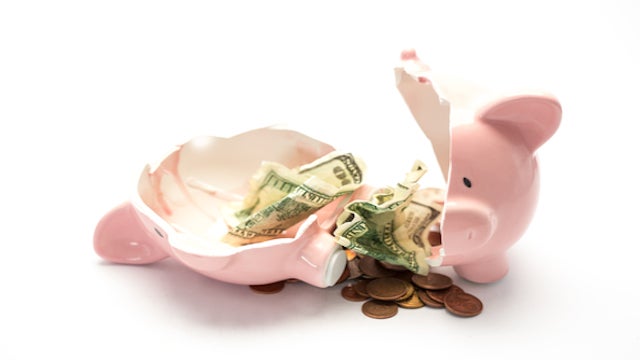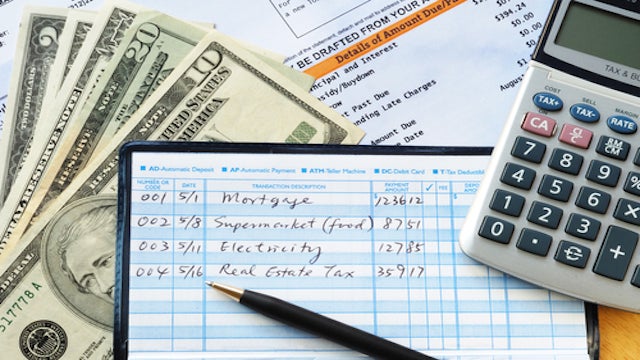Saving a lot of money is like trying to run a marathon. If you dwell on how long the race is, you might not even get off the couch. But if, instead, you focus on putting one foot in front of the other and running one mile, and then two miles, and so on, suddenly a marathon doesn't seem quite as intimidating. Try to think about your finances in the same way.
Minor changes that you make right now can have a major impact on your long-term financial security, according to Stephany Kirkpatrick, senior director of financial planning and aCertified Financial Planner at LearnVest Planning Services. Below, she shares eight quick and easy tips that can help you slowly and steadily stash away cash—and we profile real people who've put them to the test, much to the benefit of their bottom lines.
Open a Separate Savings Account
Simply put, you want to keep your checking account and savings account at two different banks. Erica Zidel, 31, of Boston, Mass., who runs the babysitting startup SittingAround.com, says that this is the single best thing she's done to save money. "I kind of forget that I have the savings account, so I'm not tempted to dip into it," she says. "Since doing this five years ago, my savings have grown 400%."
Kirkpatrick agrees that the out-of-sight/out-of-mind mentality is helpful—plus, it usually takes two to three days to access money from a separate savings account, so you probably can't spend it as impulsively.
Set Up an Automated Transfer
It's easy to promise yourself that you're going to transfer a certain amount of money into savings each week or month, but following through takes an awful lot of time, energy and discipline. Take the process out of your own hands by either asking your company to regularly deposit a portion of your paycheck directly into your savings account (that's ideal, says Kirkpatrick, because you never even see the money) or asking your bank to regularly transfer a certain amount of money from your checking account to your savings account.
"My husband and I set up an automatic transfer with our bank between our checking and savings accounts, " explains Kendal Perez, a 28-year-old marketing manager at Kinoli Incorporated in Fort Collins, Colo. "Each week, $50 is transferred, and we don't typically miss it. That has helped us build an emergency fund and cover costs like car insurance and vehicle registration." And do it frequently: "If you transfer from checking to savings, I recommend weekly transfers, because they keep your checking account more level. You won't feel a huge dip once a month," says Kirkpatrick.
Bring Your Lunch to Work
Did you know that the average American who eats their lunch out during the week spends nearly $1,000 a year? Stuart L. Cantor, Ph.D., a 49-year-old pharmaceutical scientist in Mt. Airy, Md., used to be tempted to go to a Chinese or Indian restaurant with co-workers for lunch on occasion and drop $12 to $15 each time.
"Now I bring my lunch to work every day. Either my wife and I will cook something or I'll microwave a frozen Indian dish that costs $1.99 for 14 ounces. I always eat something healthy and delicious, so I don't feel cheated," he says.
"The key to making this habit stick is to make sure you're not taking an enjoyment factor out of your life," says Kirkpatrick. "Have one or two splurge days if you need to. Bringing your lunch 3 or 4 days a week is still better than none." Ask your co-workers if they want try this strategy too and eat with you, so you'll get the same sense of camaraderie that you would at a restaurant and they'll help hold you accountable.
Just Add 1%
Add 1% of your gross income to your retirement savings every six months. The idea is to keep doing this gradually until you reach the maximum amount that you're allowed to contribute. Maximums can change year to year. For traditional or Roth IRAs, for example, the current limit is $5,500 (and $6,500 for those 50 or older). For 401(k)s, it's $17,500 for those under age 50 and $23,000 for those age 50 or older.
"1% is a good amount because it's a painless but significant step in the right direction. You can live without that small amount of money," says Kirkpatrick. If you are contributing, say, 2% right now, within about 4 years you'll slowly grow that amount to 10% without even feeling it by following this strategy.
Track Your Spending for One Month
Before you can spend less, you need to figure out exactly where your money goes. You might think you have a good idea, but many people are surprised by what they find.
Hudson Valley, N.Y. writer Virginia Sole-Smith, 32, certainly was when she used a spreadsheet to track what she and her husband spent on groceries in May and June of this year. But the exercise helped her pinpoint areas where she could slash costs. "We were spending $75 a month on individual, 6-ounce Chobani yogurts at a fancy grocery store! Now we buy four-packs and 32-ounce tubs from Stop & Shop," she says. Tricks like this have enabled her to cut her yogurt bill nearly in half and spend 37% less on all her groceries.
"Pay attention to recurring costs, like cable TV bills and gym memberships. Ask yourself if you're getting your money's worth," says Kirkpatrick. If you're not, it might be time to buy an HDTV antenna (a one-time fee) or pay for Hulu or Netflix (which are recurring fees but are less expensive than cable). Or you may want to watch free exercise videos on YouTube instead of taking gym classes.
If your weak spot isn't a recurring cost, try putting yourself on a cash diet, says Kirkpatrick. For instance, if you can't enter a shoe store without purchasing three pairs, don't go in there with a debit or credit card—take only a certain amount of cash, so you can't go crazy.
Use a Rewards Card Wisely
"For the past 17 years, my husband and I and our five children have saved by charging everything on my Southwest Airlines card and paying off the balance in full each month. We rack up free miles so we can visit family in Raleigh and take vacations, like a trip to San Francisco, at much lower costs," says Andi Wrenn, a 46-year-old financial counselor in Arlington, Va."Over the past four years, we've earned anywhere from 3,000 to 12,000 miles per month."
This tactic can be advantageous, Kirkpatrick agrees. "But only if you spend within your means and pay off the balance in full every month, so you have to stay disciplined," she advises.
Set Reminders
One big money drain can be forgetting to pay a bill—and then getting slapped with a late fee and/or having to pay interest on a credit card payment. This can be easily avoided by getting organized.
"I started using a hard copy planner (and then a few years ago, I switched to using a Google digital calendar) to record reminders throughout the year for different money deadlines, such as paying monthly bills, contacting my tax professional, reviewing insurance policies, getting a credit report and more," says Ray Advani, 42, of Chicago, who founded the blogSquirrelers.com.
"Over the past 10 years, this has saved me about $1,000 and prevents a lot of stress!" he adds. You can also schedule alerts via email or text. "Setting reminders is a helpful strategy for people who lead busy lives," says Kirkpatrick. "You can also ask vendors, like your cable company or electric company, if they can reset your payment due date. You might prefer to have all your due dates on the same day for convenience or it might help your cash flow to spread them out over the month."
Move Your Savings to an Online Bank
"Consider putting your savings into an online bank, as opposed to a brick-and-mortar bank, because the interest rates tend to be higher, so your money will grow faster," says Kirkpatrick. For example, if your emergency fund sits in Citibank's savings account, it'll earn .01% interest. If it sits in Ally online bank's savings account, it'll earn .87% interest. And, as this story shows, even little differences can add up.




 Note: This article is from J.D. Roth, who founded Get Rich Slowly in 2006.
Note: This article is from J.D. Roth, who founded Get Rich Slowly in 2006.


